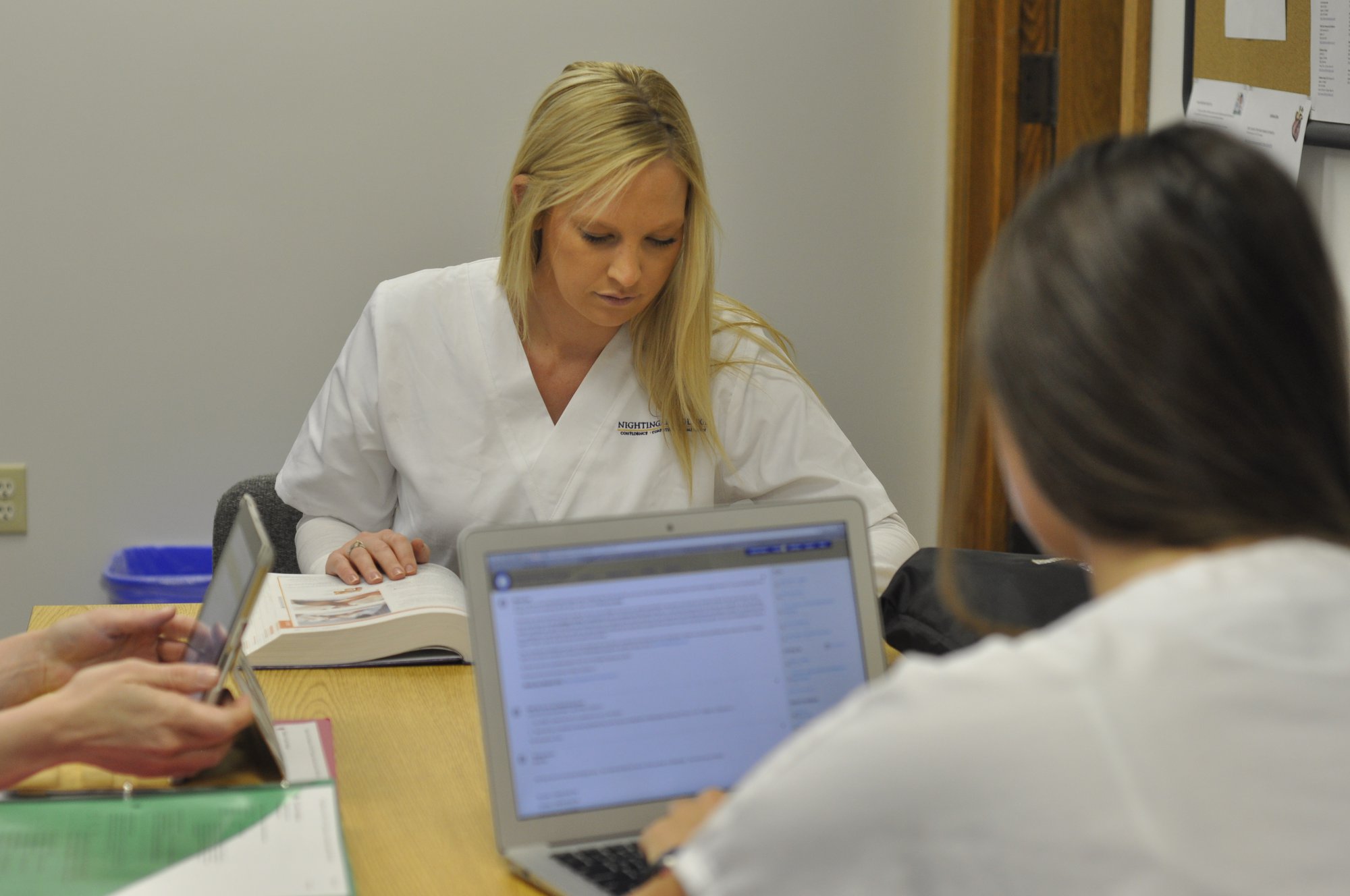Should I Become a Nurse? An In-Depth Analysis of Why Nursing Could Be the Right Career Path for You

There’s no debate about it: nursing is a rewarding career. You are on the frontline of fighting disease and your contribution to the healthcare system literally saves lives.
At the same time, it is a stable and fairly well-paid job. And the need for nurses is at an all-time high, so, by becoming a nurse, not only will you help individual patients during some of their most challenging times, you would be helping the entire healthcare system.
According to the American Nurses Association (ANA), by 2022 there will be far more registered nurse jobs available than any other profession.
So far, nursing sounds amazing. And then you remember that there is a great deal of responsibility that comes with this profession, the demanding tasks, and the emotional side of the job. You count all of these various factors in and you find yourself asking:
Should I really become a nurse?
Regardless if you are just choosing a career path, if you want to switch to nursing because you no longer find meaning and satisfaction in your current job, or if you felt inspired by the tremendous courage and selflessness nurses display in this time of pandemic – we, at Nightingale College, are here to answer some of your most pressing questions about becoming a nurse.
The good, the bad, the in-between – this guide will discuss all the facets of nursing, so by the end of this piece you will be better equipped to make an informed and critical decision whether nursing is truly the path for you.
Do You Have What It Takes? Must-Have Qualities for a Nurse

Good nurses have a well-rounded set of skills that make them successful in their field and are crucial to their ability to save lives. Before we dive into what really makes nursing a good career choice, let’s take a minute and explore some of the skills and qualities all great nurses have in common.
You don’t necessarily need to check all the boxes, but if you’re considering a career in nursing you must work to nurture and improve these qualities.
Patience
Being patient is a valuable skill for nurses. The environment in which they’re working is defined by its fast-moving nature, so not only do nurses have to keep up with it, they must do so in a calm, composed manner. They might have to carry out multiple doctors’ orders or they might have to deal with stressed staff, noncompliant patients, demanding families – but in midst of tasks piling one on top of the other and pressures adding up, nurses must keep their composure and calmly solve things one by one. Sometimes, as a nurse, you have to patiently take a step back and ensure you never lose track of your main priority: taking care of patients with the highest level of professionalism.
Flexibility
The ability to adapt to change is one of the most important skills for nursing. The healthcare environment is constantly changing, shifting, improving, or quite the opposite – undergoing major crises. Policies change. Workflows change (take, for instance, the current pandemic situation: workflows have increased dramatically and nurses need to know how to deal with this in order to avoid burnout.) Even a patient’s state can change – someone who was in a stable condition a few minutes ago could be fighting for their life now.
In nursing, change is not linear and organized, so nurses must always be prepared to face the unexpected. Meanwhile, they must make sure this constant change isn’t taking a toll on their mental wellbeing.
According to a Nightingale College graduate who started her practice right when Covid-19 struck, flexibility is one of the most important qualities for a nurse. Find out more of her professional story in the video below.
The 5 Cs (Commitment, Conscience, Competence, Compassion, Confidence)
Commitment
Nursing is more than just a career. It’s one’s way of being. Becoming a nurse means you should be ready to go above and beyond when needed, it means you are committed to upholding strong values and, above all, it means you are dedicated to caring for your patients. Commitment also applies to life-long learning, because, in nursing, the only way for you to keep delivering the highest quality care is if you never stop learning.
Conscience
Conscience ensures nurses have a strong sense of moral responsibility and work ethically to represent the concerns of their patients. Conscious nurses display high levels of empathy, being able to put themselves in the patients’ shoes, which, in the long run, helps them be better professionals.
Competence
As a nurse, you must be the epitome of competence. Even the small details matter, such as arriving to work on time and presenting yourself in a professional manner. Nurses must hold themselves to a high standard of excellence and complete daily tasks to the best of their ability. Also, competence entails a need to continually develop your skills and knowledge as learning is a lifelong process in nursing.
Compassion
Being understanding, empathetic, and considerate in nursing is of vital importance. Compassion helps nurses provide kind and attentive treatment at all times. It also helps them build nurse-patient relationships and find a deeper sense of meaning in their work.
“The number one thing that I always do is just reflect back on why I even went into nursing, and that was because I truly enjoy helping people. I want them to heal, I want them to know that I’m compassionate towards them and that I really care about their total outcome as a human being, not just as a patient.” Tayler Allen, RN.
This kind of selfless compassion should be at the heart of nursing because this is what’s going to make you a great nurse.
Confidence
When going to a hospital, patients must be sure they will receive the highest quality care. Therefore, a nurse who isn’t confident will raise concerns among patients about their health and safety. Having confidence in their skills, education, and experiences will ensure nurses keep putting their best foot forward. This ability leads to positive outcomes in patient care.
Empathy
Being able to put yourself in another person’s situation, recognize and appreciate their perspective, and think beyond your own concerns. That’s what empathy is. Basically, it’s the difference between feeling bad for someone and feeling bad with someone.
Empathy builds connections, so nurses must realize they are there for some of the most challenging days in the life of a person, hence they have a unique ability to provide powerful support. With empathetic nurses, patients feel heard, supported, cared for, and validated to a whole new level, which is important to their healing process. As a nurse, being empathetic should be integrated into your everyday practice.
Communication Skills
Among the skills a nurse should have, communication is an important one. Nurses are usually the unifying link between physicians, caregivers, patients, and families, so they must know how to communicate with all of them accordingly.
According to a 2014 research paper – Communication in Nursing Practice, nurses who display courtesy, kindness, and sincerity (both through their words and actions) are more successful at establishing a good rapport with their patients. Good communication between nurses and patients is essential for the nurses’ ability to provide individualized care for each patient. Communication is imperative in all areas of nursing, from prevention, treatment, therapy, rehabilitation to education, and health promotion.
Reliability
Working as a nurse requires you to be reliable. People need to know they can count on you, from patients to your fellow nurses and doctors. Providing healthcare is a team endeavor and you must be willing and dedicated to play your part and make your indispensable contribution to helping people.
Leadership Skills
To a certain extent, all nurses are leaders. Their unique position in the healthcare ecosystem allows them to guide patients towards wellness, help out new co-workers, and even help doctors expand their knowledge/information about their patients’ situations. All of these require leadership skills.
Willingness to Learn
Healthcare is an environment that’s ever-changing and nurses must keep up with the pace by always being up to date with new techniques, procedures, and equipment. Continuous education has become the center-stone of the profession. Many hospitals require nurses to complete a certain level of continuing education every few years to keep the validity of their license. Also, of course, if you want to advance in your career, you must be willing to learn and advance your education by getting a BSN and/or an MSN.
What Are the Benefits of a Nursing Career?

With great responsibility come great benefits and nursing is surely a career that is rich with those. The road to becoming a nurse might be challenging, but in the end, the benefits make the investments of time, money, and energy worth it.
Great Job Outlook
According to the US Bureau of Labor Statistics, employment of registered nurses is projected to grow 12 percent from 2018 to 2028, much faster than the average for all occupations. That is largely because of the national nursing shortage, caused by (among other factors) an aging population and insufficiency of nursing faculty.
Because the healthcare system is in such distress and the need for nurses is spiking, the job outlook for the profession is great. According to a survey by the AACN 75% of new BSN graduates and 75% of MSN graduates had a job offer at the time of graduation. The same survey found that within 4 to 6 months from graduation 94% of both BSN and MSN graduates had a job offer. So, when going into nursing school you’ll have a high level of confidence that you should be able to secure a job shortly after graduation.
Stable Industry
According to an article in The Atlantic, the healthcare industry is the biggest employer in the U.S. Not only that, but healthcare is a stable industry and the need for nurses is only growing, so you can rest assured that not only will you find a job, you will keep it, as nursing is generally a recession-proof job.
Bureau of Labor Statistics projections indicates there will be about 210,400 openings for registered nurses each year, on average, over the decade. The need for nurses will only be further accentuated by the retirement of seasoned nurses, with over one million nurses expected to retire by 2030. With the need for nurses only growing in numbers, now is the time to join the ranks, both for the sake of a safe, stable career and for the sake of your country.
Good Compensation
Nurses are also compensated fairly well. Per the BLS, the average salary of a registered nurse in 2019 was $77,460. If you choose to advance your education, you will enjoy significantly larger paychecks, as careers that require MSN pay (sometimes a lot) better. For instance, nurse anesthetists make around $181,040, nurse practitioners – $111,840 and nurse midwives – $108,810.
Find out more about how much nurses earn in every state.
High Job Satisfaction
Nursing generally gets high ratings in the job satisfaction department. 83% of nurses in the AMN Healthcare 2017 Survey of registered nurses declared they were satisfied with their choice of nursing as a career. This view was consistent with younger nurses, as well as with the older generations of RNs.
Numerous Career Opportunities
The nursing field is, in fact, tremendously varied. You can pursue careers in both hospital and non-hospital environments; certain career paths will give you more control over your schedule, or you could even choose a career that combines nursing with one of your other biggest passions. Some of the numerous career opportunities that a degree in nursing bring are:
- Primary patient care. If you want to work hands-on with patients, if you like the dynamism and the unexpectedness of the job, consider a job in an emergency room. Working in an ER you’ll always be right in the heart of the action.
- Work in private practice. Generally, you’ll enjoy more independence, but you will have to specialize in a certain area of nursing (depending on the specialization of the doctor you’re working with)
- Hospice care nurses. As baby-boomer population numbers are reaching an all-time high, there is an increased need for geriatric care. So, you could choose to treat older patients in assisted living facilities.
- Nurse educators. This is a career path that is typically less stressful than that of a typical RN. You might find employment both in hospital settings and non-clinical, such as colleges and universities If you love teaching and care for the future of the healthcare system, becoming a nurse educator might be for you. Find out more about how and why you should become a nurse educator.
- Nurse-midwives. If contributing to the miracle of life is a particularly powerful incentive for you and you enjoy working with mothers-to-be and newborns, you could consider midwifery.
- If you’re interested in technology, you could be a nurse informaticist.
- You can take your leadership skills to the next level and pursue a career in nursing leadership. If responsibility doesn’t scare you, you could manage whole nursing departments, as well as facilities and budgets.
These are only a few of the possible career paths you might embark on as a nurse. But depending on what you like and what you seek to get out of the job, you could find a nursing career that is absolutely perfect for you.
The Possibility of Pursuing an Online Education
Nursing allows for the possibility of (at least partially) studying online. Should you consider getting your BSN in nursing, you could opt for the blended distance format which allows learners to engage in online didactic instruction with on the ground experiential learning. Online learning options are more flexible and career friendly – you can still learn while working full time; they’re not limited by geographic boundaries and allow you to assimilate information in your own time.
Things to Consider Before Becoming a Nurse

As rewarding as this field is, it does come with its own set of challenges. Nursing is a demanding profession, both physically and psychologically. If you’re leaning towards a profession in the nursing field, these are some of the main things you must take into consideration.
Varying Schedule
Depending on your work environment, your shifts could be lengthier and more demanding. Nurses who work in private doctor’s offices might work 8-hour shifts for 5 days a week, but since hospitals are working around the clock, the typical 8 to 5 shift is not really a possibility for RNs working in hospitals. Instead, they might end up working three 12-hour shifts, followed by roughly two to five days off.
12-hour shifts, while indeed exhausting, have their benefits: they provide better continuity (patients are under the care of a different nurse only twice a day), the shortened work-week is generally appealing to nurses, as it can translate in better work-life balance, more flexibility and more time spent with the family. However, you must also keep in mind that you might be required to work night, weekend, and even holiday shifts.
It’s a Challenging Environment
Nurses often need to work long hours under stressful conditions, which can result in fatigue, injury, and job dissatisfaction. There are also other factors that make the healthcare environment particularly stressful. There is physical labor involved – from lifting patients and equipment to being on your feet all day long with little break.
Also, there’s a higher risk of exposure to work-related dangers, such as exposure to infectious diseases. The current COVID-19 pandemic is making it increasingly evident how challenging nursing can be. Nurses have to deal with understaffing, equipment shortages, longer shifts, and various other pressures. In addition to all of these, because they’re on the frontline of defense, nurses are also extremely vulnerable to contracting the virus.
In such a pressuring environment, nurses must be aware of burnout and how to avoid it.
The Need for Continuous Education
We’ve mentioned this before, but there is really no way to downsize the importance of continuous learning in nursing. Even if you’ve already completed your studies, hospitals might require you to follow training in areas such as clinical management, pain management, recognizing child or domestic abuse, or ethics.
According to AACN, 43.2% of hospitals and other healthcare settings are requiring new hires to have a bachelor’s degree in nursing, while 82.1% of employers are expressing a strong preference for BSN program graduates. So, even if you have a valid nursing license from your ADN degree, you might want to consider an RN-to-BSN program in order to obtain your bachelor’s degree in nursing and become more competitive on the job market.
How Can You Actually Become a Nurse?

If you’ve read through all of the above and, in retrospect, you’ve discovered you have the qualities of a good nurse and the benefits of a nursing career outweigh the challenges, you might find yourself wondering… how do you actually become a nurse?
If that’s the case, keep on reading and you’ll find everything you need to know in order to start your career in healthcare.
Find out what to expect when you start thinking about enrolling in nursing school.
What Are the Steps to Becoming a Nurse?
- Get your high school diploma or your GED diploma. Before starting your formal nursing education, you must have a certain level of knowledge in elementary subjects such as Math, English, and Science.
- Earn a degree in nursing. Earning a degree in nursing is the first step towards getting into this profession. The most common and sought after is a BSN. However, some positions are also available to candidates with an ADN degree, while others are exclusively available for MSN trained nurses. Explore some of the available nursing degrees and decide which one is the best fit for you.
- Associate Degree in Nursing. By earning an ADN you will get you the foundational knowledge and skills needed for nursing practice. ADN learners are prepared for entry-level practice as a nurse to work in a variety of health care settings such as hospitals, outpatient surgery centers, urgent care clinics, and long term care.
- Bachelor of Science in Nursing. More and more nurses are opting for BSN degrees, not only because it is expected
that a BSN will become a mandatory qualification in the field (IOM has asked for an
increase in the number of BSN prepared nurses in the workforce to 80%), but also because
holding a BSN opens the door for significantly more career opportunities tailored
more precisely to your needs and preferences. You should make sure the college you
choose to attend is accredited to avoid challenges during job interviews.
Find out everything you need to know about national and regional accreditation and ensure that the institution you choose is properly accredited.
- Master of Science in Nursing. Should you want to advance your nursing career even further, earning an MSN is the next step. An MSN degree is an advanced, post-graduate degree that will provide the skills and advanced training for more specialized roles, such as nurse educator, nurse practitioner, or nurse-midwife. Naturally, the higher you climb on the educational ladder, the better the benefits: higher compensation, more flexible schedules, less stressful work environments.
- Apply for RN licensure and take the NCLEX-RN® exam. Aside from simply applying to a program, you must actually complete its requirements, which will lead you to the next step: applying for RN licensure and taking the NCLEX-RN® exam.
- Start your nursing practice. Upon completion of a nursing program and passing the NCLEX-RN® exam, you can start looking for a job. Fortunately, nursing jobs are widely available, the growth of the field being almost double in nursing compared to other jobs. However, keep in mind that certain locations and specialties might be more competitive.
- Keep on learning. Nursing is an ever-evolving field so you must make sure you are always on top of your game in order to offer the best possible care for your patients.
What Type of Program Should You Choose?

When it comes to nursing education, luckily, you have lots of options. From online to on-campus or hybrid programs – you just need to choose the best fit for you.
- On-campus BSN programs are probably the best option if you’re starting nursing from scratch. This is a good option if you don’t have to divide time with other important responsibilities, such as work or family.
- Blended-distance BSN programs. They are great if you have no prior nursing experience, but you’d like to enjoy the benefits of online education. You will engage in online coursework which is combined with learning activities close to home or in your community. This type of program takes as few as 32 months to complete. However, you also have the option of studying at an accelerated pace and completing the program faster.
- Online RN-to-BSN programs. This is a program dedicated to RNs who are already working in the field. It takes up to 12 months to graduate, but you can also opt for an online RN-to-BSN program with an accelerated timeline, which can be completed in just 8 months.
Keep in mind that getting your BSN fully online is not possible as most online programs have an offline component that requires you to complete labs and clinicals in order to get hands-on experience.
Find out everything you need to know about getting your BSN and what is the best option for you.
Nursing is a wonderful career for everyone. In healthcare, it doesn’t matter if you’re a man or a woman, young or old. All that matters is a strong passion for helping others. If you’re dedicated, empathetic and your main drive in saving lives and making a difference, then nursing IS the right career for you. Do you have the courage to follow your calling?
If you’ve decided and nursing is the path for you, our guide on how to ace nursing school will make your life a little easier and your learning experience a lot more interesting!

